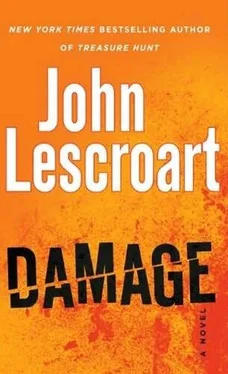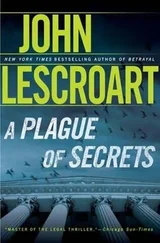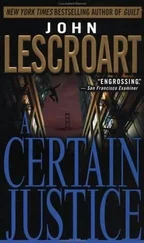Glitsky had come to the service as part of his chief’s appeasement strategy, thinking that some reporter from the Courier or the Chronicle or one of the TV stations might be among the audience, and would interpret his presence there as having something to do with his investigation, and not to do with Ro Curtlee. In fact, he had arrived at the ceremony with every intention of pulling Michael Durbin aside and trying to get some clearer information either on his alibi for the time of the murder or on the situation, if any, between him and Liza Sato. He even considered that he might reveal the chlamydia angle and see where that led them.
But seeing the family now so rawly exposed, and with the children around, he simply met Durbin’s eye and nodded in apparent sympathy as he walked past and let them all go to their waiting cars.

“I think you should call Jeff Elliot back.” Chuck was drinking a beer, sitting on the counter in his kitchen, talking to Michael Durbin while the reception continued in full swing in the living room. “Give the guy an interview in the Chronicle , go on the offensive.”
“What’s the offensive going to get me?” Michael asked. He held a glassful of bourbon and took a drink of it. “It’s what Peter said this morning, the more I deny it, the more it sounds like I’m hiding something.”
“Mike.” Chuck put a hand on his brother-in-law’s shoulder. “Listen to me. We know who did this, right? So, you notice anything missing from the Marrenas column? Like all the reasons we know it was Ro. Did she mention that you were the foreman of Ro’s jury? No. Or the murder of that other woman, the witness? No. Or any other very good reason Glitsky might have been concentrating on Ro instead of you? That’s a lot you could tell Elliot right there that somehow isn’t making its way into the conversation, don’t you think?”
“I don’t know. I don’t think anything anymore. I mean, even Jon’s starting to have the idea that…”
But Chuck cut him off. “No, he’s not. He’s just devastated by his mom dying, and who can blame him? He doesn’t really believe you had anything to do with it, I promise. Hell, he’s eighteen. He’s trying to find someplace to put all this emotion he’d rather deny he’s feeling, so Marrenas gives him the idea and he takes it out on you.”
“He’s smarter than that.”
“Maybe, but he’s all fucked up right now. Just let him work it out.”
“What other choice do I have, anyway? I don’t know where he’s got to.”
“He’ll be back, don’t worry about that. Meanwhile, you call the Chronicle . You know they’ll talk to you. Get Ro out there in front of the story where he belongs.”
“That son of a bitch. But then what if he comes after me, or the kids?”
And at this, Chuck drew a breath, drank off a slug of beer. “I hadn’t thought of that,” he said.
“I haven’t thought of too much else.” He lifted his glass to his mouth and half emptied it. “I know what I should do, I’m not kidding.” Lowering his voice, he said, “I ought to go kill the guy myself.”
Chuck shook his head. “No. That’s a bad idea.”
“I’ve got a fucking shotgun out in my garage. I’ve had it forever, from back when I used to hunt. They can’t trace a shotgun. I go over there to Ro’s house some night, knock on the door, start shooting. Then I throw the gun in the bay. And tell Glitsky I was, say, with you the whole time, drinking away my sorrow.”
“I’ve already said that’s a bad idea. Now I’ll say it again. That’s a really bad idea.”
“I don’t have any other ideas.”
“Well, lose that one. It totally sucks. You’re not a killer, Michael, you couldn’t do that. It would ruin your life.”
Durbin tipped up his glass, finishing the drink. “As opposed to what it is now, you mean?”

Sheila Marrenas was waiting just outside the door of the outer lobby of the chief’s office when Vi Lapeer got back from her lunch meeting. She was talking to one of her chief detectives and didn’t notice the reporter until Marrenas stood up and blocked her way. “Excuse me, Chief. I’ve just got a quick question for you.”
“And I’ll be glad to answer it,” Lapeer said. She looked at her watch. “In forty-five minutes at my press conference. That’s why we have press conferences. So I can talk to the press. Now if you’ll…”
She started forward, but Marrenas moved to the side, blocking her. “This can’t wait!”
“Well, I’m afraid it has to, because…”
Marrenas stepped directly in front of her. “Isn’t it true that you’ve assigned round-the-clock surveillance to follow Ro Curtlee wherever he goes? And that you’ve authorized budget and even overtime for this surveillance? And in spite of all this time and overkill, no one seems to know where Ro is right now? Isn’t that true? Is that your idea of efficient use of an already overextended police budget? How can you possibly justify such an expensive, useless waste of money and personnel?”
Lapeer’s mouth hung half open in shock, although she quickly recovered. “I have no comment,” she said. “No comment. Now if you’ll excuse me…”
And with that, the similarly astonished assistant chief next to her took her arm and, without touching Marrenas while moving her gently to the side, got her inside the lobby to her office and closed the door behind them.

Hector Murillo was not aware of the concept of six degrees of separation. He was a twenty-seven-year-old day laborer who’d come up from Mexico in 2004 and who remained undocumented. For the past eight months, Hector had been a regular in the four-man landscaping crew of Roberto Serrano. He was still pretty much low man both because he’d worked for Roberto for the shortest time and because he was Mexican and not Guatemalan.
But that was basically okay.
The difference between low man and high man wasn’t so great anyway, not when his boss Roberto himself did whatever had to be done-grunt work like cleaning out gutters or spreading decomposed granite by the cubic yard-as well as the mowing and blowing and trimming. All in all, Hector was grateful to have a regular job, where he got paid in cash every week.
Hector lived in a trailer park just east of the 101 Freeway in Mountain View, and many nights he would hang out drinking beer with other men, mostly from Mexico, who found themselves in situations very much like his own. This was what he’d been doing last night when Jorge Cristobal, one of the guys from the park, had mentioned the five-thousand-dollar reward that Lupe García was offering to find a woman whose name used to be Gloria Gonzalvez. Evidently her mother had died in Guatemala and she had come into some money, and her lawyers had contacted the well-connected Lupe in the hope that, for a portion of the inheritance, he could help locate her so they could all get paid.
That was the story, anyway.
At first, Hector didn’t think much about this, other than to try to fantasize how much five thousand dollars really was. He made sixty-two dollars a day, six days a week, about fifteen hundred dollars a month, and that covered food and rent and clothes and beer, but not much else. He didn’t own even a share of a car; he had no insurance. And even so, he had amassed a savings of exactly zero after two-thirds of a year of steady work.
It wasn’t until he’d been lying in bed, trying to sleep with that huge number floating around in his brain, that he realized that Roberto’s wife’s name was Gloria. She was also Guatemalan-or at least he assumed she was, since that was Roberto’s nationality. It would certainly be odd if she wasn’t.
Читать дальше















